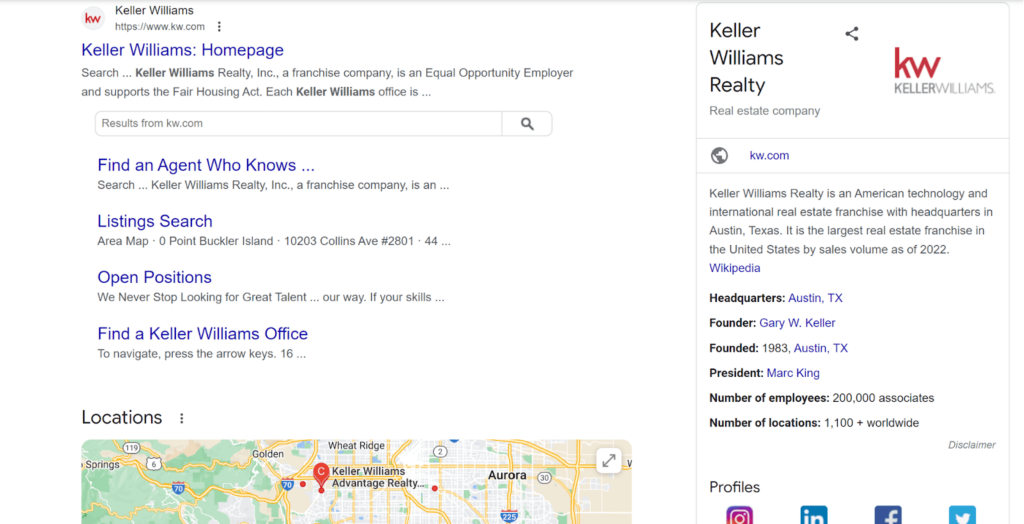You know best that real estate is an incredibly competitive market—and that the waiting on leads to come through Redfin, Homes, and Zillow (even with their latest updates) isn’t sustainable. With constant changes to the platforms, an influx of realtors, and a hard-sell market, you need a better way to increase your leads—without increasing your workload.
The solution? SEO, or, more accurately, SEO for real estate.
What is SEO? Does SEO Work for Real Estate?
SEO or search engine optimization is the process of optimizing your website to show up, get found, and be clicked on in Google and other search engines (even AI answer-engines, like ChatGPT and Perplexity).
SEO for realtors or real estate just references the industry-specific strategies that will help you, specifically, rank your website in the top search spots.
And yes, this works really well for real estate—in fact, according to a study done by the National Association of Realtors in 2024, all homebuyers used the internet in their search and many started the homebuying process online, with 43% of buyers indicating that their first step was to look on the internet.
Leads found through SEO, and even more so through local SEO (something that you can take advantage of and optimize for as a realtor), are more inclined to buy. Meaning the journey from “maybe we should buy a house” to “this is the house I want to buy” is shorter (and more aligned).
How to Rank First Page on Google for Real Estate
Ranking on the first page of Google is any business’s goal—you want to drive more traffic, you want to get the first click, and taking the first spot while Zillow takes #2 is one of the best feelings to have. But, it’s a process.
Just as you’ve built a reputation and relationship with your past clients (which has lead to some amazing referrals), you have to build that same relationship with Google for it to recommend you (rank you) in search results.
And just like how you have to pay attention to what your buyers are looking for to find the right home—and sellers are looking for to find the right buyers—you have to check all the “Google” boxes to get in the platform’s good graces.
Which is why you need an SEO strategy.
How to Create an SEO Strategy for Your Real Estate Business: 4 Simple Steps to Get Started
An SEO strategy is a mix between the keywords you use, the presence you have, and the ongoing effort you make (and how you make it) to create ways to better serve your clients.
SEO is impacted by almost everything on your website—from your user experience and how people interact with and spend time on your pages to how other websites interact with yours, too.
Rather than trying to play the SEO guessing game on where to get started, here are four simple steps (or tips) you can take:
#1. Pick Your Keywords (and Optimize Your Core Pages)
The first step in creating your SEO strategy is to pick your keywords. Look for keywords that are low difficulty, higher in traffic, and match your audience’s search intent (are they buying? Learning? etc.).
Here are a few examples:
- Location-Specific Keywords: [City] real estate or [Neighborhood] homes for sale
- Property Type Keywords: Single-family homes for sale
- Buyer and Seller Keywords: First-time homebuyer tips or How to buy a house in [City]
- Real Estate Services Keywords: Property management [City] or [City] real estate agent
- Educational Keywords: Real estate market trends or Home buying process explained
- Local Amenities Keywords: Schools in [Neighborhood] or [City] public transportation
- Home Improvement Keywords: DIY home improvement projects or Boosting curb appeal [City]
- Market Insights Keywords: [City] real estate market report or Housing market predictions [Year]
- Legal and Process Keywords: Real estate contract explained or Understanding closing costs
If you can, spend the extra few minutes to research your keywords and a few variations using an SEO keyword tool to find the one with the most opportunity to rank, here’s some of my favorites you can try.
Assign one keyword to one page (this is your primary keyword, you cannot reuse a primary keyword—that’s keyword cannibalization) and optimize your page by adding it to your metadata, copy, and images alt. descriptions.
#2. Optimize Your Property Listings
Your core web pages aren’t the only way to get found (and rank) on Google—your property listings can, too! Optimize your property listings by finding keywords that best fit or describe the property and it’s location.
Each property listing should be well-optimized with descriptive titles, detailed descriptions, and high-quality images. That way, people will find exactly what they need and be able to reach out to you if they’re interested.
#3. Set Up Your Google Business Profile
Google Business (or GBP) is an online business directory hosted on Google that helps with your local SEO as a realtor. When people search for realtors in their area, Google Business listings are often among the first search results. They appear as the right-hand sidebar—you’ve probably seen and used them yourself.

A GBP prominently displays your contact information, business description, customer reviews, photos, and maps for local offices. This makes it easy for someone to learn about your business and contact you; they don’t need to do much research to find what they need because it’s all on your profile.
It’s also great for learning more about the audience you’re currently reaching. GBP provides insights into how clients find your business, where they’re located, and what actions they take. These analytics can help you refine your SEO and marketing strategies—plus, you can build more trust with Google when you get your clients to leave reviews on your GBP.
#4. Create an On-Going SEO Strategy
Part of SEO is creating an expanding influence online—something that takes time to do. When you create this influence, there are two different methods you could focus on: creating trust by expanding the resources on your own website or “borrowing” trust by connecting with other websites.
The first method requires a content or blogging strategy, where you regularly publish SEO blog posts answering in-demand questions, providing valuable insights, or simply explaining processes to your buyers and sellers.
The second method is your off-page SEO strategy and relates closely to “PR” in how it works. But you’re essentially building backlinks (having other websites link to YOUR website) and “borrowing” the trust they’ve built with Google.
You can get backlinks by guest posting on their website, being featured in online magazines, signing up for spots in directories, and even being a guest on a podcast.
If you have the time and resources, you can do both and improve your SEO to see results even sooner.
Stop Relying on Listing Sites for ALL Your Leads (And Do This Instead)
You’ve noticed the increasing competition—and you’re tired of applying to list houses or wait for an inquiry on every third-party website. It’s time to get the website you already have to put in the work FOR you with SEO.
All your leads don’t need to come from listing sites, they can find you immediately—no “middle man.” You just have to optimize so that Google (and other search engines) can find you.
Ready to get started? Book an SEO health check or audit to see (and fix) any underlying issues and may be impacting your performance in search and have an SEO strategy designed just for you.




Comments +